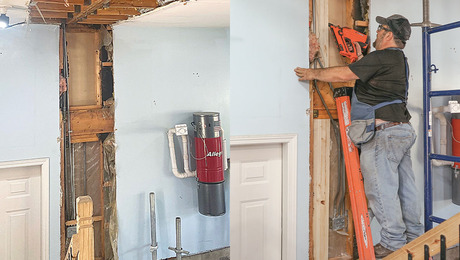I’ve got a question for a knowledgeable plumber.
A friend of mine who is a very talented carpenter is redoing a bungalow. He did the ABS piping under the floor before I came over to take a looksee, and realized he’d used PVC glue. He is English and didn’t know that the “black plastic pipe” wasn’t PVC. I cautioned him about the difference and he’s planning now on finishing up the job with ABS glue.
The question is about the work that is already glued and is underneath the flooring. Is there any reason re redo it? I know the pipe won’t be under pressure, and it should all flow downhill, but am somewhat nervous about using unapproved materials. We’re also in earthquake country, and it seems to me that if a joint isn’t “solid”, that a good jolt could result in one or more joints simply coming apart.
Any good, sound advice here? I don’t want to have him do work unnecessarily, but also wouldn’t want him to finish this up and have a disaster later on.
John















Replies
"A friend of mine who...."
Right. A friend of yours...!
LOL!
Rich Beckman
Another day, another tool.
Just think of this as a bump....
Rich, let's concentrate on the problem at hand.
I don't have the answer.
How much would you bet that it's him?
Tom,"Rich, let's concentrate on the problem at hand."I think we should wait until John gets an answer to his question. I don't want to be guilty of hijacking a thread before its time (maybe too late....!)Rich BeckmanAnother day, another tool.
Rich, I'm an ex-general contractor who specialized in solar heating. This *is not* my mistake. Before I became a GC I put in a schedule 40 PVC line and used ABS cement by mistake. About 2 years later the line blew apart and I had a disastger. I had to dig up and replace all of that 1 inch line. So, I'm willing to own up to stupid things I've done.
What I'm curious about here is whether my friend can get away with the ABS as is ... glued with PVC cement. I can probably convince him to change it, but only if I have solid arguments I can use. We live in Los Angeles and the only problem I can foresee are earthquakes.
Note that in my solar heating life I had some .75 inch sweated copper come apart in an earthquake. The joint was well soldered but just pulled apart (it was a 45 degree fitting) because of the jostling. Like it was painted silver and just pulled out. Blew my mind, but it happened. I probably should have used more strapping, but this was a run on the roof and I didn't want to penetrate and have possible leaks.
Anyway, back to the question at hand. Will this cause a problem?
John
John,My apologies. I never actually thought you were talking about yourself. I intended it only as a joke.Looking back at it I guess the "LOL" really doesn't make that clear.Maybe a :) ???Should've just kept my keyboard still, eh?May you have a prosperous New Year.Rich Beckman
Rich, you shouldn't have to.
He knew, you knew, I knew. :)
What harm will occur if a joint fails?
Have him try making a joint the old way, with some scrap and a spare tee. Let it set overnight and then subject it to some significant stress and see how it holds up.
If the lines are still accessable, I would re-do them. Why gamble with it? It's pretty easy to do now and may be a real PITA later. If there is a crawl space and these are sewer lines, would you really want a friend to crawl around in THAT fixing them someday? - lol
Following the directions on the can should be authoritative enough. If the can does not label it for use with ABS, then it won't work satisfactorily.
I don't know jack about plumbing - so I thought I would chime in
I have been chastized by more than one plumber for using the glue that is labled as multi - purpose (ABS, PVC, CPVC) - they told me that stuff doesn't hold well - only use the glue that is specific for the pipe
That said - I have never heard of a pipe I glued with the all purpose coming apart
After the second plumber telling me about this - I no longer use the all purpose
More Opinions?
Here's one where I can help.
There are quite a few types of adhesives for typical solvent-welded piping: ABS to ABS cement, PVC to PVC cement, CPVC to CPVC cement, and ABS to PVC "transition cement". They're formulated differently to give full-strength joints when used correctly.
There are also cleaner/solvents for use with PVC and for use with ABS (different solvent mixtures) and their use is NOT OPTIONAL- this is the single most frequent mistake made with solvent-welded piping- you MUST use the primer/cleaner on both sides of EVERY JOINT otherwise you will not get a full strength joint even with the right cement.
The sch40 PVC pipe someone did with ABS cement was intended for a pressurized application. These glue joints were bound to fail, because ABS cement on PVC pipe does not give a solvent weld anywhere nearly as strong as the pipe and fittings themselves. The two plastics do not mix or "alloy" properly to provide a full-strength joint, though they will fit together.
DWV pipe, on the other hand, is not under any pressure and is not under a great deal of strain if it is properly installed. You can use weak joints like rubber couplings with gear clamps on them and the joints will survive adequately without leaking. If the piping is improperly supported or has been forced to fit, then some strain on the glue joints should be expected.
If your friend used transition cement, intended for gluing PVC to ABS, to do the whole ABS job, there's not much to worry about. The joint will not be up to full strength, but it is adequate for DWV applications and if it seals now it's unlikely to leak later.
If your friend used PVC cement, not intended for use with ABS pipe/fitings, on the whole job, and it seals now, it too is probably OK- but there IS the possibility joints may leak later especially if they're under strain from bad installation practice. The greatest risk is one of leakage rather than total joint failure and the piping popping apart.
If it were my house, I would rip out and replace anything readily accessible and glue it with the proper cement- the rework will give you peace of mind without really too much cost or labour. Anything already behind finished surfaces, I would leave and take my chances, since I suspect that the re-work now is probably not going to be much less than the re-work required to fix a leak.
My SIL was in an apartment where the plumber failed to glue the tailpiece connection from the sink into the tee in the wall -- just dry fit. It took two years for it to develop a noticeable leak.If the pipe is properly supported it doesn't take much to hold it together.
Waitaminnit !!!You mean my pex glued end-to-end with pvc glue isn't going to hold ?Dang !I KNEW that was too easy.
The person you offend today, may have been your best friend tomorrow
"...pex glued end-to-end with pvc glue...was too easy."Gluing pex end to end with pvc glue was EASY?????????!!!!!Sounds like a royal PITA to me!!LOL!In case there is any doubt, I know you were joking.Rich BeckmanAnother day, another tool.
Wellll...Yeah.I had to taper the end of one piece, and countersink the end of the next. Then I used duct tape to hold it together while the glue dried.But those pieces of pex are real long, and can be bent around corners...Saaay... You don't think it's just the duct tape holding my pipes together, do you ??? Dang ! I'll NEVER get a good shower out of that...
The person you offend today, may have been your best friend tomorrow
Sure you would- but not if you actually stood in the shower....<G>
:)
The person you offend today, may have been your best friend tomorrow
That depends on whether you wrapped duct tape around it.